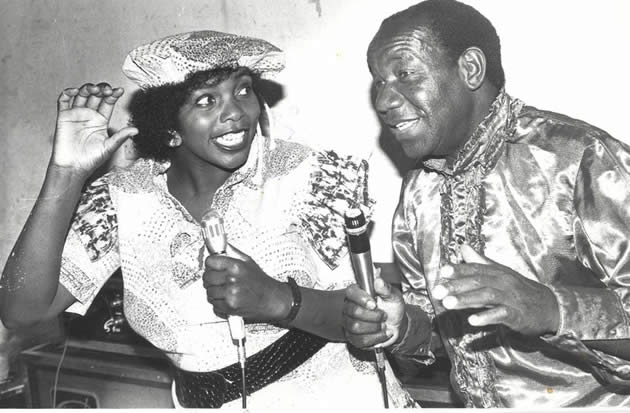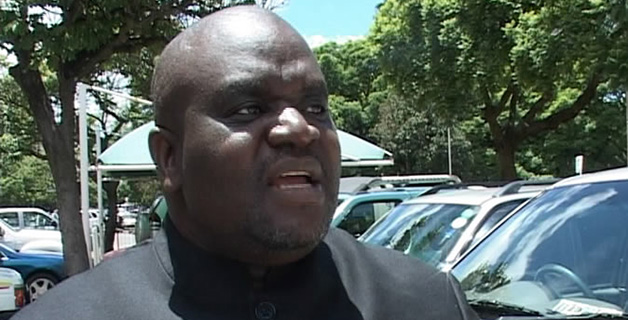Mukadota: A gifted musician, actor


KWAHANYANI . . . Safirio Madzikatire (right) and Elizabeth Taderera aka Katarina in one of their popular duets
Stanely Mushava Arts Correspondent
Safirio Madzikatire, affectionately known as Mukadota, straddles two genres as one of the best comedians and musicians ever to emerge out of the country. No other local artiste has attempted Mukadota’s feat as the best of both worlds, with the few exceptions like Oliver Mtukudzi and Freddy Manjalima being naturally versatile in one genre and modestly accomplished in the other.
Madzikatire is most remembered as face of the popular 80s drama series, “Mhuri YavaMukadota”.
He had a big musical following and most of his humorous hits stole the limelight. The humorous jams, notably “KuHanyani”, “Ndichatenga Yangu” and “Usandisiye”, mostly assumed light-hearted conversation between two personas, Madzikatire as Dickson and Elizabeth Taderera as Katarina, whose chemistry was, by turn, combative and endearing.
His screen wife Susan Chenjerai, known in the hit series as Mai Rwizi was in the news few years ago saying she had renounced secular show business following her conversion to a Pentecostal church, while Taderera is now late.
Elijah Madzikatire, his heir, teamed up with John “Chibhodhoro” Muyambo in 2002 for the production of Bhero Mukadota. While the comedy was well received at the time, it dwarfs in comparison with the older man’s act.
Elijah, who once complained that his father confined him to minding gate-takings at the expense of his own gift, also made his mark in the early eighties with nationalist-oriented songs such as “Gwenyambira”.
The younger Madzikatire’s inventory engaged a more serious outlook than his father with such tracks as “Vana Tinogumbura”. Sadly, it failed to secure the durable acclaim enjoyed by Mukadota.
Madzikatire got started off in the late 40s, having passed through the tutelage of established arts couple Kenneth and Laina Mataka. By then, he had no special advantage, not being an able singer or dancer, but armed only with desire and conviction that he would secure his own corner in the arena.
When he got into the industry, musicians were not held in high esteem. Suffice to say, artistes were metaphorical bees who seldom secure a household stake no matter how much enjoyment their honey exudes. Madzikatire was oblivious of this tag and pushed for his dream.
Having nurtured guitar and vocal skills under the Matakas, Mukadota went solo, doubling as a comedian and a guitarist.
He would soon occasionally join celebrated ensemble the Golden Rhythm Crooners when they toured Salisbury, effortlessly hogging the attention to his comic and charismatic stage persona.
The solo guitarist, then colloquially known as maskandi, was the rugged age of township entertainment and Madzikatire soon made his own mark, teaming up for shows with fellow guitarists like Jordan Chataika who later crossed over to gospel. Mukadota’s career includes a duet with pioneer gospel artiste, Chataika, when the latter cut the first Christian-oriented seven single in Zimbabwe, “Vana Ve- Israel”.
Madzikitire formed his first band Tanganda Tycoons in 1964 following a brief stint with Afro Jazz Fiesta. The group featured his screen accomplice, Chenjerai, with Leo Chirenda as a guitarist and Richard Saidi on the drums. The quartet of Abigail Dhliwayo, Margret Sibindi, Gladys Motsi and Emery completed the founding complement as dancers.
The group disbanded in 1971, after a fistful of seven singles, prompting Madzikatire to revert to his solo career. Madzikatire had a brief change of fortune after taking over Delight, a musical outfit resident at Sykline Motel.
The group featured legendary saxophonist Phillip Svosve whose mastery of the instrument has spiced various music genres over the years including James Chimombe, Brian Sibalo and, more recently, Sulumani Chimbetu.
Madzikatire’s magnetic stage persona won him the leadership of the band. However, his tenure was short-lived when the group dumped him in less than a month after securing a contract with a hotel in Mabelreign.
The rude jilt dealt a body blow to Mukadota who had no instruments of his own. He was left with no option but to start afresh.
He regrouped with his former drummer, guitarist and dancers from Afro Jazz Fiesta, hired instruments from a Mbare businessman and was soon on the road again.
The revived group, renamed to Ocean City Band, soon featured memorable performers including George Pada, Tobias Areketa, Taderera, Chi- bhodhoro, Manyowa and Svosve who had rejoined from the then defunct Delight.
Mukadota undertook a successful radio drama series together with his son Elijah and Chenjerai.
Madzikatire’s fortunes took one last dip when Svosve and other members left with the name Ocean City Band after squabbles over payment. Attempts to salvage lost glory by assembling new outfits the Brave Sun and, later on, the New World all hit the wall.
Mukadota’s merry adventures ended when he passed on in 1996. However, he is still a legendary figure in Zimbabwean entertainment. Mtukudzi, one of his confessed admirers, recently paid him homage in the song “Who is a Hero?”








Comments